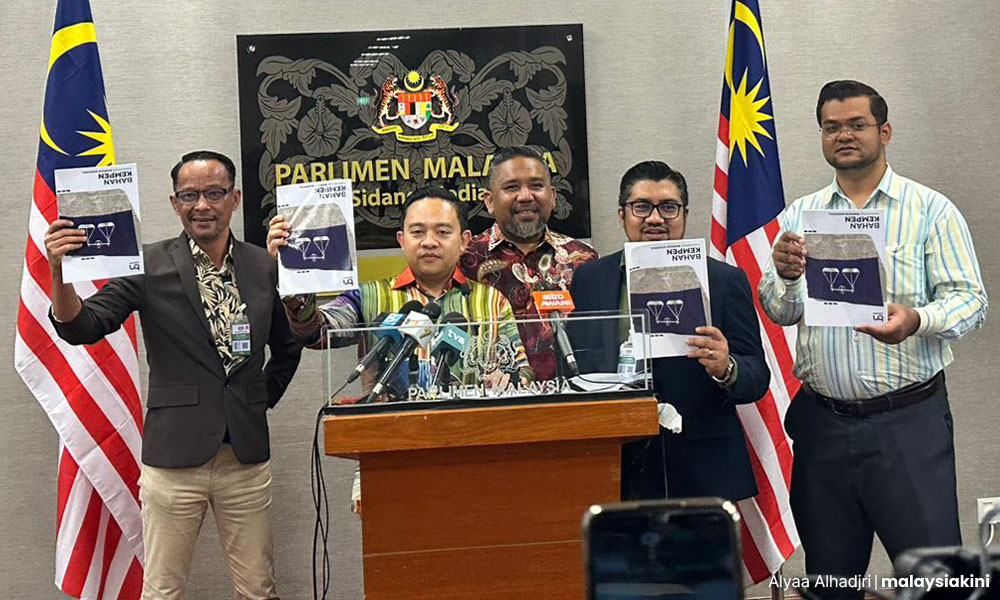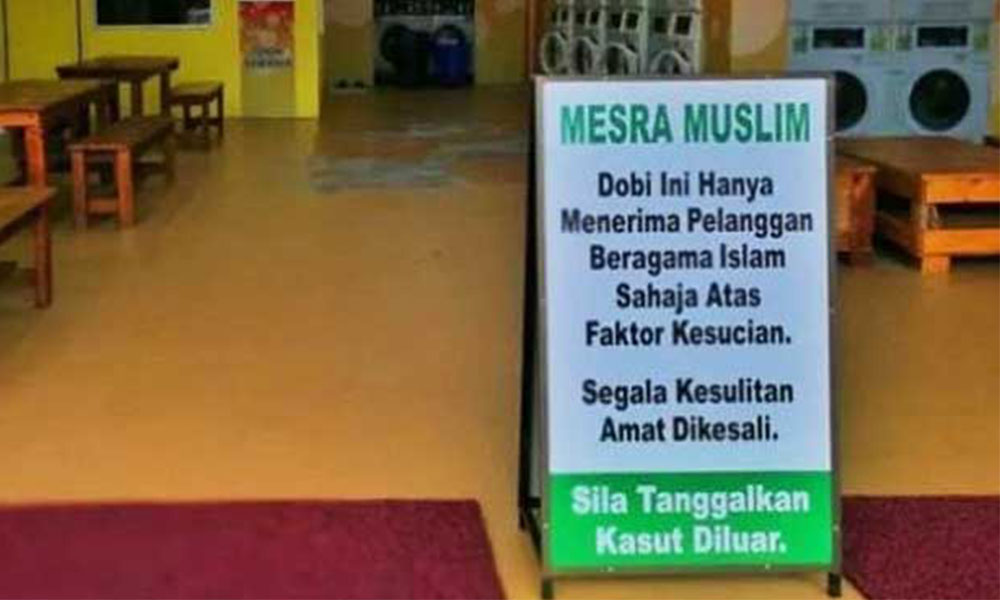Malaysia once prided itself on its multicultural identity, even marketing itself as “Truly Asia”.
Yet, now, it would seem we have become too fractured to be truly Malaysian, let alone truly Asia. We no longer have a shared national identity as Malaysians.
Certain politicians, academics, and even teachers are leading the country dangerously towards a narrow vision of conservatism, religious fanaticism, outright discrimination and even, at times, absolute idiocy.
Nothing captures the capacity for idiocy like when the Home Ministry, still living in the past, confiscated eight books with “communist” elements from a bookshop – two decades after the communist threat had frizzled out.
Or, like when an old BN booklet is used as a reference by an MP to raise the ghosts of old fears of the communist party.
Shouldn’t we be more concerned about the mindless indoctrination, socio-political divisiveness, and religious extremism, which are seeking to institutionalise differences? Aren’t they just as dangerous, if not worse, than communism?

Let’s begin with former two-time prime minister Dr Mahathir Mohamad’s labelling of political parties led by ethnic minorities as “parti pendatang” (parties of immigrants).
As a member of an ethnic minority myself, it is really hard to be told we are just pendatang, when we have known no other home but Malaysia. And it is also hard for ethnic minorities to be continually referred to by other derogatory terms such as kafir, keling, and sepet.
Most ethnic minorities of Malaysia have family histories in this country that stretch beyond a hundred years – including mine.
I know of people whose ancestors died in Malaya of the Spanish flu, who suffered in the Great Depression, who were killed during the Japanese occupation, and who were taken away for the construction of the Thai-Burma “death railway”.
However, their contributions, sacrifices, and losses have been deliberately and systematically removed from our history books.
In a recent interview, Mahathir also criticised the “immigrants” for refusing to assimilate into ethnic Malay culture.

I wonder why it is never enough to be just Malaysians. Even former prime minister Muhyiddin Yasin proudly claimed he will always be Malay first, before being Malaysian.
Do we have to be Malay - and Muslim - to be truly Malaysian? Would Muslim migrants in the UK readily renounce their own cultural and religious identities to be accepted as UK citizens?
Such ideas are a throwback to an Orwellian dystopian world as well as a threat to the wealth of diversity and the democratic principles of any country.
Institutionalised discrimination
Institutionalised discrimination and social segregation became part of Malaysian life in the 1970s with the New Economic Policy - and later iterations - through its dual-pronged goal to wipe out poverty and restructure society.
To a certain extent, the policies have failed as they should have addressed poverty by ‘needs’ instead of by ‘race’. The result: these policies have benefited some Malays who have amassed great wealth, while the majority are among the poorest communities in the country.
Meanwhile, these policies have also sidelined the ethnic minority communities and disenfranchised them.
And now, with the rise of radical Islam, the rifts between the communities have become even more pronounced.
Apparently, today, what is haram or forbidden in Islam is treated like a virulent virus that can ‘spread’ through objects, through clothes, through touch, and even through the water and air.
As a result, many Muslims are reluctant to visit the homes of their non-Muslim friends and colleagues, let alone eat or play together.
We even had reports of the segregation policies of a laundry outlet and a lift in a hotel, both incidents sparking an outcry.

It is also disturbing that a restaurant worker was unfairly dismissed for wearing a crucifix.
Intolerance of other cultures or religions appears to be growing more frequent.
However, incidents like these are not new in schools. Students from minority communities have frequently been disciplined and chastised for wearing religious icons and other items of their religions.
Recently, a school was probed for allegedly disciplining its students for wearing sarees at an event meant to foster unity.
So today, I wonder if discrimination against the culture of any ethnic minority is deemed permissible in Malaysia if it is perceived as a threat to Islamic values and its way of life.
Discrimination in schools
Our national schools also tend to overlook the social and spiritual needs of ethnic minorities. Studies and surveys have repeatedly iterated systems and organisational structures in schools that have subjected ethnic minorities to some form of discrimination.
A 2022 paper written by Latha Subramaniam to mark the International Day for the Elimination of Racial Discrimination, reveals the degree of this discrimination in more detail.
Today, parents of ethnic minority schoolchildren have also come to fear national schools as platforms for their children’s possible conversion into Islam. For instance, a parent whose intellectually challenged child was sent to a school for children with special needs told me she removed her son from the school when he was given lessons on Islamic knowledge and prayer.
It is already incredulous that we have allowed questionable textbooks that have manipulated and distorted facts in our schools. Of late, we have even allowed mock guns into classrooms. How does the use of a mock gun in a classroom help children to feel empathy and compassion and to see injustice more clearly?

Even worse, we have allowed educators with narrow and warped minds into schools. Their acts have great power, because they may inadvertently be teaching their immature students that it is permissible for one to kill or use violence against others.
Hence, national schools are no longer considered safe. Are we surprised then to see an influx of international schools and the increased popularity of vernacular schools?
Our schools should be a nexus for cross-cultural learning, understanding, and thinking. They should encourage students to experience, question, and learn about diverse cultures, empathy, and compassion from alternative perspectives.
But Malaysian schools will never favour any such ‘nexus’ lest they threaten the position of Islam. The curriculums will never be widened to allow students to visit a church or a Buddhist temple or to engage in discussions that explore the similarities between cultures and religions instead of their differences.
Such fearful learning environments can never lead to integration, nor can they be considered progressive. Yet, our Malaysian schools are nothing but fearful these days.
I fear we may be embedding outdated ideology dictated by extremism and exclusivity, both religious and cultural, within the minds of the young, warping them indefinitely. This is worse than communism.
I fear that, in the coming decades, Malaysians will be disabled from functioning in a highly challenging world governed by science, technology, innovation, and AI.
We need bold, dynamic policies that will empower the Malays and make them not only genuinely enabled, skilled, and competitive but also more inclusive in their understanding of the role and contributions of ethnic minorities.
We need to build a nation where diverse cultures and faiths are mutually respected and valued. We need to develop a society that is open and receptive to both diversity and change.
We need to forge a common Malaysian identity for all. - Mkini
SUKESHINI NAIR is the co-editor of the Aliran newsletter. This article was first published on the Aliran website.
The views expressed here are those of the author/contributor and do not necessarily represent the views of MMKtT.



No comments:
Post a Comment
Note: Only a member of this blog may post a comment.